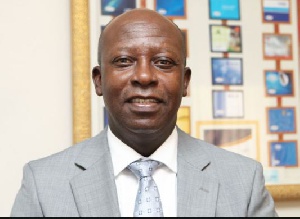 Mr Archie Hesse, Chief Executive of Ghana Interbank Payment and Settlement Systems (GhIPSS)
Mr Archie Hesse, Chief Executive of Ghana Interbank Payment and Settlement Systems (GhIPSS)
Banks are being encouraged to give their customers multiple channels from which they can access the GhIPSS Instant Pay (GIP).
This will ensure that bank customers enjoy the full complement of the convenience and speed that come with the service.
GIP is an electronic payment system that allows money to be transferred from one bank account to another of a separate bank instantly. It is the fastest and most convenient way to do interbank transfers.
All the major banks in Ghana now offer GIP but while some offer it through multiple channels others offer limited choices.
Mr Archie Hesse, the Chief Executive of Ghana Interbank Payment and Settlement Systems (GhIPSS) in an interview, urged the banks to allow their customers to access the GIP service through their mobile phones, regular internet banking and any other channel that will bring convenience to them.
He explained that with GIP, bank customers can make and receive payments instantly regardless of where they were located.
“The world is fast drifting towards the instant pay technology, which fortunately is already live and running in Ghana. The instant pay allows quick turnaround for businesses as they can send and receive money instantly, without having to move from their physical location,” Mr Hesse said.
As vehicular traffic intensifies due to the yuletide, businesses and individuals can resort to GIP to make and receive payments without having to drive through the heavy traffic, Mr. Hesse advised.
He said the GIP can be adapted for several other real time payment solutions. He indicated, for instance that some international remittance agencies were using GIP to remit funds and the money is paid directly into the bank account of the intended recipients.
Mr. Hesse urged the banks to consider various solutions that they can developed based on the GIP service to create convenience for their customer.
He was certain that banks can use GIP to develop a lot more products and use that to attract customers.
There is an obvious drive towards electronic payments in the country. Banks are advertising and encouraging their customers to use their cards, major fuel stations are now accepting cards for payment, while many service providers are accepting electronic forms of payment. At the national level, government is undertaking a number of digitisation projects.
Mr. Hesse is hopeful that all these efforts will converge with a critical mass of the population embracing electronic forms of payments and advised businesses and organisations which are yet to invest in electronic forms of receiving payments to do so before they are taken over by events.